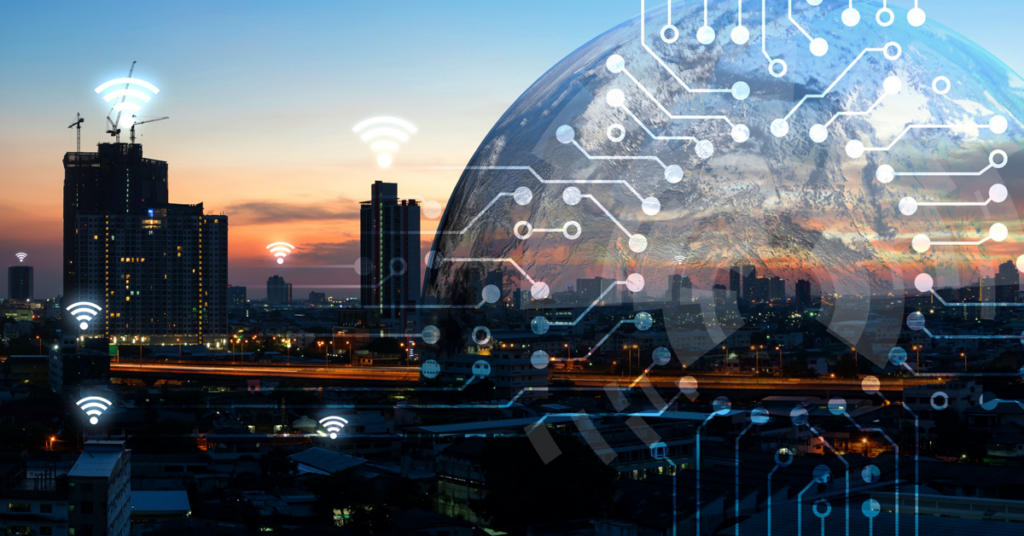
Article Outline
What is meant by a smart city?
A smart city is a modern urban concept aimed at improving the quality of life in urban areas through innovative use of technology and data. Smart cities leverage comprehensive use of information and communication technology, the Internet of Things (IoT), artificial intelligence (AI), big data, and other modern technologies to enhance resource management and public services delivery.
Modern Technologies Used by Smart Cities
Smart cities rely on a variety of modern technologies to enhance the quality of life and provide public services more efficiently. These technologies include:
- Internet of Things (IoT): Smart cities use a network of internet-connected devices to collect and share data with city systems.
- Artificial Intelligence (AI): AI is employed to analyze data and make more intelligent decisions.
- Blockchain Technology: Blockchain can be used to secure transactions and improve transparency in various sectors.
- Big Data Analytics: Big data is gathered and analyzed to understand patterns and make strategic decisions.
- Smart Grids: Used to improve energy management and deliver electricity more efficiently.
- Digital Twin: Utilized to create a three-dimensional digital model of the city.
- Communication Technologies: Such as 5G networks.
- Sustainable Energy Technology: Such as solar and wind power.
- Cybersecurity Technologies: To protect data and systems.
- Smartphone Apps and Geographic Locations: To enhance interaction between citizens and services.
Characteristics of Smart Cities
Smart cities have several distinguishing features that set them apart from traditional cities:
- Technological Infrastructure: Smart cities boast advanced technological infrastructure supporting high-speed communications and data exchange between devices and systems.
- Smart Data Collection: They rely on data collection from various sources, including sensors, cameras, and internet-connected devices.
- Sustainable Resource Management: Smart cities aim to improve the sustainability of resource consumption, such as energy, water, and waste.
- Sustainable Transportation: They focus on enhancing public transportation and promoting eco-friendly modes of transportation.
- Security and Safety: Smart cities include advanced systems to ensure public safety.
- Collaboration and Engagement: They encourage citizen, business, and government interaction through digital platforms that facilitate communication and information exchange.
- Cybersecurity: Special attention is given to securing data and systems.
- Integration and Social Interaction: Efforts are made to enhance integration between different services and community sectors.
- Urban Planning: Smart cities adopt flexible urban planning models that can adapt to the needs of the population and the environment.
- Innovation and Digital Economy: They encourage the development and use of technology and innovation to boost economic growth and attract investment.
Smart Cities in Saudi Arabia
Saudi Arabia is planning to transform many of its cities into smart cities as part of its Vision 2030 initiative, which aims to diversify its economy and improve the quality of life for its citizens. Here are some examples of smart cities in Saudi Arabia:
- NEOM (New Future): NEOM is one of the world’s largest mega-projects aimed at building a smart city from scratch. NEOM aims to achieve sustainable development and leverage cutting-edge technologies like AI, machine learning, and renewable energy.
- Riyadh Smart City: The capital city of Saudi Arabia is working on transforming itself into a smart city, using information and communication technology to improve government services and enhance the lives of its residents.
- King Abdullah University of Science and Technology (KAUST): KAUST is one of the prominent smart university cities in the Kingdom, with advanced infrastructure and a focus on research and development.
- King Abdullah Economic City (KAEC): KAEC is a massive project to build a smart city on the shores of the Red Sea, aiming to promote investment and diversify the Saudi economy.
- Prince Mohammed bin Salman Medical City: This city serves as an advanced medical center that utilizes modern technology for healthcare services and medical research.
- Jubail Industrial City: Jubail employs advanced technologies in industrial project management and production efficiency.
Experts vision Consulting (EVC) Company – Leading the Way in Sustainable Smart City Services and Consulting
Experts vision Consulting (EVC) stands out as one of the top companies in providing services and consultations for the implementation of sustainable smart cities. With their specialization and extensive experience in the field, the company offers innovative and sustainable solutions to cities worldwide. Experts vision Consulting (EVC) boasts a team of experts and engineers specializing in various smart technologies and practices that contribute to improving the quality of life in cities and promoting environmental and economic sustainability.
Experts vision Consulting (EVC) possesses several key factors that make it the preferred choice for sustainable smart city consultations:
- Comprehensive Experience: The company has a wide-ranging experience in delivering smart city services across various sectors.
- Specialization and Expertise: It has specialized and technically qualified teams in a variety of smart technologies.
- Innovation and Research & Development: Experts vision Consulting (EVC) places great importance on innovation and continuous development to provide advanced and innovative solutions to its clients.
- Proactive Vision: The company strives to understand the future needs of its clients and offers sustainable solutions to meet those needs.
- Sustainability: Experts vision Consulting (EVC) is committed to environmental and economic sustainability, aiming to reduce cities’ impact on the environment.